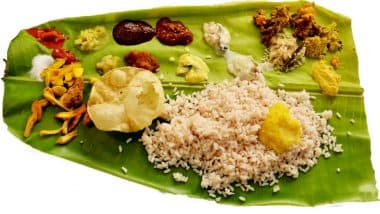It's the longest-running diet debate of all times -- is vegetarianism better than non-vegetarianism? Meat eaters have always argued that their vegetarian friends may be lacking in nutrients like proteins, calcium and certain vitamins. Bulking up on a veg diet is probably the highest joke among the bodybuilding circles. But the truth is that there could be a lot of benefits to a plant-based diet, whether non-vegetarians want to believe it or not. On World Vegetarian Day, we asked an expert to find out whether there are any benefits of a plant-based diet.
Dr Surya Bhagwati from Dr. Vaidya’s New Age Ayurveda she opines: “According to Ayurveda, good health is primarily determined by the kind of food we eat. A human being can obtain complete nourishment and normal development right from birth with a pure vegetarian diet.” Experts still believe in following a balanced diet where equal amounts of vegetables and meat are both incorporated, but vegetarianism has its own merits.
One of the oldest codified traditional systems of medicine, Ayurveda has a rather sophisticated approach to health and nutrition to manage and treat diseases. It names diet as an important component in disease management, without which, any treatment will be ineffective. For any preventive and therapeutic intervention, Ayurveda stresses on the importance of vegetarian nutrition. That’s because the ancient system of healing is deeply entrenched in values of compassion and ahimsa, which opposes animal slaughter. Dr Bhagwati makes some relevant points that explain why Ayurveda’s focus on vegetarianism may be right.
The Human Intestine
Dr Bhagwati says that human beings are better suited to a vegetarian diet because the length of the human intestine is three to four times longer than that of carnivores. Longer intestines are features of herbivorous animals, who need the extraintestinal length to break down fibrous plant-based foods. Although the human gastrointestinal tract is not as long as those of herbivorous animals like horses and bovines, it is not as short as those of carnivores.
Digestive Acids
Human digestive acids are much weaker in humans compared to other animals who eat meat. The digestive acids in carnivores are stronger to aid the breakdown of flesh foods. Conversely, in plant-eating animals, the acids are much weaker, which suggests that humans are better suited to a vegetarian diet.
Amino Acids
Dr Bhagwati points out that the human body produces 22 of the amino acids needed to make proteins. “The human body produces 13 of the 22 amino acids the human body needs. The remaining 9 can be obtained from plant foods.
Teeth and Jaws
The jaw and teeth structure of carnivorous animals and humans are vastly different. “Those of humans are made for eating food like nuts, shoots, leaves and flowers. They are not meant for eating flesh,” she says emphatically. Animals made for hunting and scavenging on meat have sharp claws and nails, capable of tearing into the flesh. Same goes for their teeth; they are too blunt to masticate flesh.
Digestive Process
Non-vegetarian food is not easy to break down; they take too long to digest. Accumulation of food for an extended time inside the digestive tract causes the formation of toxins or ama in the system. This toxin is responsible for a laundry list of illnesses. “Ama can also produce kidney stones, gout and gallstones when they are accumulated. Non-vegetarian food is the most putrefactive food,” adds Dr Bhagwati.
Exaggeration of Protein Requirements
Dr Bhagwati contends that the protein requirements of an average human being are much lesser than what is believed to be. In the last century, protein deficiency was considered the most widespread dietary problem in the world, creating a fake crisis. But it is mostly exaggerated. A vegetarian diet replete with plant proteins can give you just enough and is easier to digest than animal-based proteins.
Vegetarian Diet for Convalescence
During bouts of acute or chronic illnesses, a vegetarian diet may be more beneficial for the human body, according to Dr Bhagwati. While fighting an illness, the body is already overworking itself to repair itself. So it makes more sense to eat a vegetarian diet since it may not overwork the body with the additional burden of digesting the food. That’s why Ayurveda prescribes a veg diet in conjunction with the treatment.
Risk of Poisoning
When it comes to food poisoning, the common culprits are usually nonvegetarian foods like eggs, fish or meat. Salmonella, Campylobacter and E.Coli are generally transmitted through animal products. “The risk of food poisoning by bacteria and parasites, which are harmful to the human body are minimal in a vegetarian diet,” she adds. Most of the animals reared for their meat is also not brought up in their natural habitat. They are crammed together in cages under unhygienic conditions, which may increase the risk of pathogen-based diseases.
Ayurveda Allows Meat, But…
Some may argue, saying that traditional Ayurveda does not call for a completely vegetarian diet. Many texts do prescribe eating meat, but it differs from the way meat is produced and consumed today. In people who have a lot of Vata, eating meat can do a lot of good. But meat should be prepared in a light, easy-to-digest style to reap its full benefits.
So is a vegetarian diet better? There’s no easy answer to the question, except that both have their own merits and demerits. In Ayurveda, good digestion is at the centre of good health. So the reason why Ayurveda stresses so much on vegetarianism is that it is easier to digest and a faulty digestive system is the cause of many illnesses.
Apart from that, vegetarianism is considered sattvic or pure, natural and vital to health, according to Ayurveda, which promotes mental and spiritual well-being. Many schools of thought believe that a balanced vegetarian diet is replete loaded with nutrients that aid the growth of the human body. “It can be full of vitamins, fibres, unsaturated fats, folic acid, magnesium, iron, iodine, zinc, proteins, etc.,” says Dr Bhagwati. So if you don’t want to switch entirely over the vegetarian side, going veg from time to time and reducing the intake of animal products may have beneficial effects on your health.
(The above story first appeared on LatestLY on Oct 01, 2018 07:07 PM IST. For more news and updates on politics, world, sports, entertainment and lifestyle, log on to our website latestly.com).













 Quickly
Quickly


